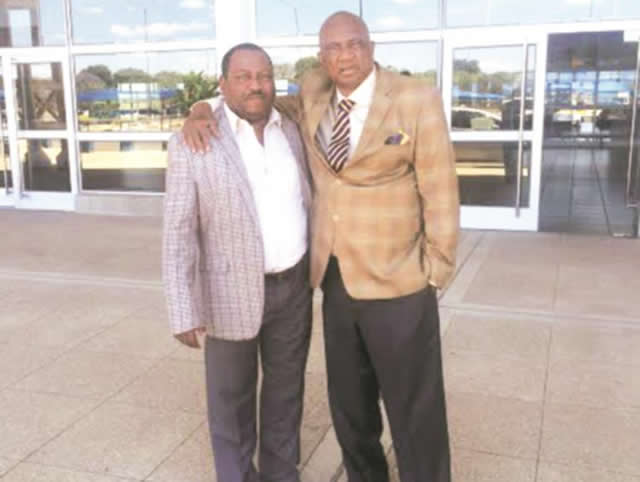Chinodya’s ‘prophecy’ about book industry

Beaven Tapureta Bookshelf
When renowned writer Shimmer Chinodya called Bookshelf to say that he has just come across his interview published twenty five years ago, he sounded elatedly retrospective.
“I was dusting my shelves and came across this piece published twenty five years ago, ha-ha! Ha! What do you think?” Chinodya happily said over the phone.
I also imagined how Chinodya might be feeling that day reading the article from the past…. I imagined a new morning arriving, this time without dew “Dew in the Morning is one of his book”!. I could see Chinodya waking up and, few hours later, going around his house selectively looking for something, a souvenir, a dew-drop from the past.
At 58 and with his hair turning ‘wizardly’ white, he is one of Zimbabwe’s own literary brainbox. Brushing aside the victories, he opens the window to let in some fresh air and suddenly he decides to dust the bookshelves in his personal library.
After a lot of dusting the shelves and yet scrounging for that “dew-drop from his past” among the jumble of books, he stumbles across an old article cut from an October issue of Parade magazine published in 1990! The cutting beams with the headline: Zimbabwe’s Authors a Force to Be Reckoned With. A photo of him in his trademark spectacles radiating with a smile accompanies the article.
Below it another article headlined “Writers Pay Tribute to Black Insider”, a report about the successful launch of a fellow great writer Dambudzo Marechera’s posthumously published book “The Black Insider”. What a blessed memory!
Still holding the article in his palm like a little bird which feels it belongs to the comfort of creative hands, he sits on a nearby stool. His thoughts somersault backwards to the interview, to the year 1990, to the award.
He remembers the launch very well. His writing fellas like Charles Mungoshi and others had read tributes to their late friend Marechera. And Flora Veit-Wild, Marechera’s biographer, had spoken at the launch about the huge influx of letters and poems written by Marechera’s admirers, budding writers, students, which she receives. A celebration.
Oh 1990! Chinodya also remembers he was the chairman then, not of ‘fools’ (“Chairman of Fools” is one of his books!), but of Harare branch of a national writers’ organisation called Zimbabwe Writer’s Union (ZIWU). Although the interview was done on the basis of him having won the 1990 Africa’s Commonwealth Prize for Literature worth 500 British pounds for his novel “Harvest of Thorns”, the crux of it (the interview) was about his comments on various issues affecting African writers in general and Zimbabwe in particular. By 1990, he had already published four books, namely, “Dew in the Morning”, “Farai’s Girls”, “Child of War” and the winner “Harvest of Thorns.”
Twenty five years have gone by now and yet certain parts of the interview seem ‘prophetic’! The interview discussed issues of recognition, the study of Zimbabwean literature in foreign universities, a declining reading culture, lack of confidence, language, writer-publisher relationship and the connection that exists between a writer’s life and the stories he/she creates.
Chinodya, 33 years old then, had already become popular with readers especially those in school. The interviewer, however, wanted to know why it had taken Chinodya, who had started writing in his teens, too long to gain recognition. Is winning an award the recognition meant here?
He said, “I think in writing recognition means more than just winning awards…Real recognition remains a lifetime pursuit….” These are humbling words from someone who had just won a prestigious award.
1990 saw the emergence of a new generation of writers succeeding Chinodya’s generation. He described his contemporaries as having been “more sensitive, more experimental, more craft-conscious, more honest and dogmatic than ever before” and he hoped this had set precedence for emergent writers.
This habit of winning, Chinodya pointed out, will make Zimbabwean literature get “re-issued in other editions, stocked in libraries, translated or placed on the reading lists of universities and colleges”.
With the numerous awards Zimbabwean writers have scooped over the last two decades, true that our literature is being read or studied outside the borders, not only award-winning works, but also other works that are relevant to Africa and the world. There are Zimbabwean writers in the diaspora who, when they visit home, make sure they purchase lots of local reading stuff to take back to their different countries of adoption!
A Zimbabwean writer based in America recently shared on social media photographs of him reading Shona poetry anthology “Bhuku Risina Basa Nokuti Rakanyorwa Masikati” (by Memory Chirere) to his mainly English-speaking creative writing class in Sacramento! No doubt that Zimbabwean literature either in English or in local languages is traveling beyond the borders to be read at home and in schools or colleges.
“We are not a book-loving nation — a good percentage of our population is probably allergic to books and will catch newsprint-fever the moment they enter a bookshop,” Chinodya observed a long time ago. Today, reading culture has generally been affected by social media, erased book buying power and other factors.
In 1990, Chinodya still wondered why writers do not get “the physical, psychological, material and moral support that enables them to practice their craft effectively”. He wondered why fellowships and grants for writers did not exist and even today, they still are non-existent. This sometimes makes writing a shameful job!
Naturally, confidence dries up in the whole nation, replaced by what Chinodya called “the inferiority complex about our own writers and literature”.
And yet Chinodya, in his 1990 interview, said, “I think our publishers could work harder at promoting their authors and not just their books. A good publisher ought to be a writer’s friend and agent.”
At the end of the varied interview, Chinodya is asked how he is going to spend the 500 pounds that came with the Commonwealth Prize for Literature which he had just won.
While he acknowledged this was a moment for celebrating with his kids, he also said, “You know what I’ll do? I’ll cash the cheque and get myself a few drinks first. I deserve it, don’t I? Afterwards I’ll perhaps be able to plan how to spend the money.”
I then imagined Chinodya, after reading the article, rising to his feet to continue with the dusting of his bookshelves and later, deciding to make a call . . .









Comments